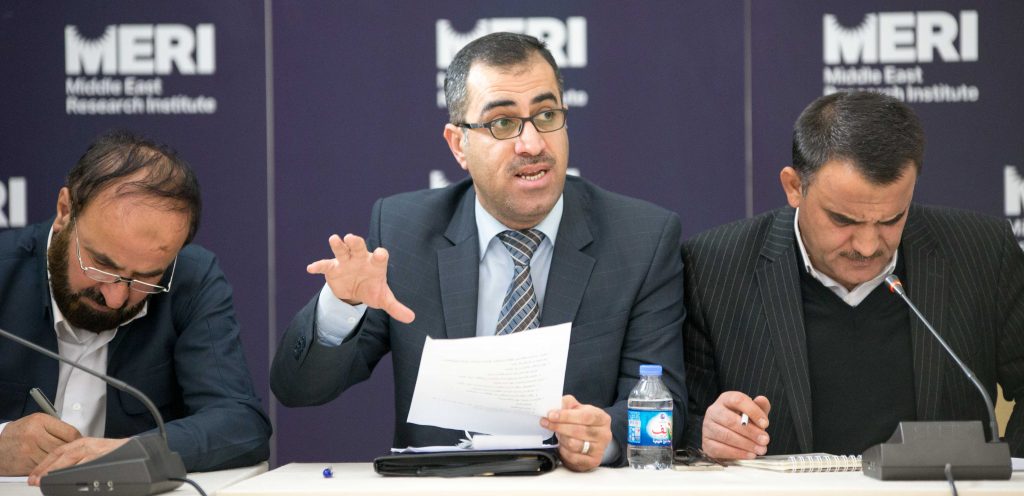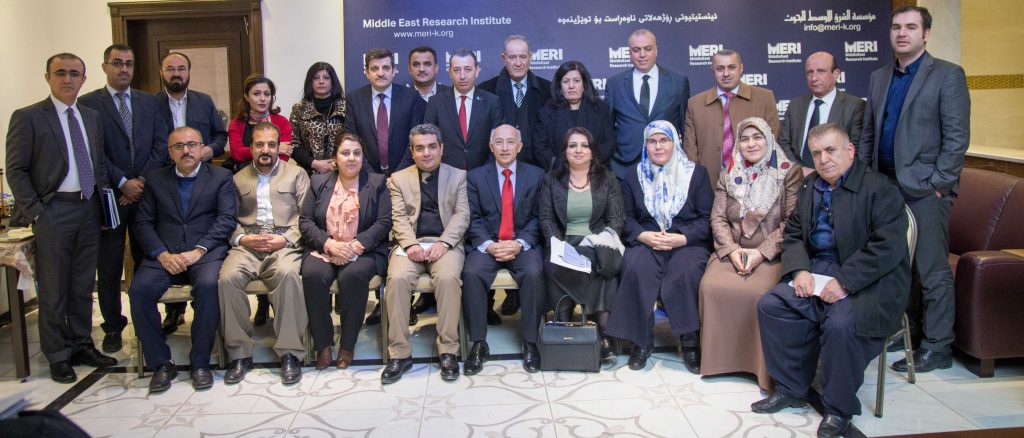In the light of the current political deadlock in the Kurdistan Region and as an initiative to revitalise the role of the Kurdistan Parliament and further promote dialogue between the political parties, MERI organised a roundtable on Tuesday 31 January 2017 for key Members of Parliament to discuss the current election law and the need for its amendment.
The event was in collaboration with the Legal Development Institute, and attended by the Deputy Speaker, several heads of different parliamentary blocs, members of the parliamentary Legal Committee and other MPs. Also invited were members of the Independent High Commission for Election and Referendum in the Kurdistan Region.

The roundtable addressed key aspects of the legislation that require internal debate within the political parties as well as consensus between them. These included:
- Defining constituencies: how the electoral boundaries should be drawn, and whether the Kurdistan Region should remain as a single constituency or should be divided into multiple electoral constituencies.
- Candidate listings: Should the electoral list of entities and candidates be closed, open or semi-open?
- The formulas for accounting or re-distributing extra (remaining) votes.
- Should the protected allocated seats (quota system) for ethnic and religious minorities be revised, and if so, what criteria should be used?
- Should the disputed territories be included in the elections?
- How to build confidence in the election process, maintain a reliable electoral register, and control forgery and vote rigging?
Clearly, there are many different electoral models in place that can be utilised to improve on Kurdistan Region’s election law which has evolved over the last 25 years in response to the local political dynamics. This issue requires extensive debate before a final draft of the amendment law is prepared. Therefore, attendants were encouraged to discuss these complex issues within their political parties and return to the forthcoming MERI roundtable with clear views before final drafts are prepared.

These roundtables are part of a long term project and one of a series of activities designed to promote dialogue between political parties, reactivate the Parliament, and help MPs to further strengthen Kurdistan’s democratic institutions. They need to ensure that the existing legislation is fit for purpose and meets people’s aspirations.

* * * * *
About MERI: The Middle East Research Institute is Iraq’s leading policy-research institute and think tank. It is an independent, entirely grant-funded not-for-profit organisation, based in Erbil, Kurdistan Region. Its mission is to contribute to the process of nation-building, state-building and democratisation via engagement, research, analysis and policy debates.
ankara escort
çankaya escort
ankara escort
çankaya escort
escort ankara
çankaya escort
escort bayan çankaya
istanbul rus escort
eryaman escort
escort bayan ankara
ankara escort
kızılay escort
istanbul escort
ankara escort
ankara rus escort
escort çankaya
ankara escort bayan
istanbul rus Escort
atasehir Escort
beylikduzu Escort
MERI’s main objectives include promoting and developing human rights, good governance, the rule of law and social and economic prosperity. MERI conduct high impact, high quality research (including purpose-based field work) and has published extensively in areas of: human rights, government reform, international politics, national security, ISIS, refugees, IDPs, minority rights (Christians, Yezidis, Turkmen, Shabaks, Sabi mandeans), Baghdad-Erbil relations, Hashd Al-Shabi, Peshmarga, violence against women, civil society. MERI engages policy- and decision-makers, the civil society and general public via publication, focused group discussions and conferences (MERI Forum).

